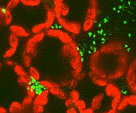Authors
C. Robin Buell, Institute for Genomic Research, Rockville, MD
Vinita Joardar, Institute for Genomic Research, Rockville, MD
Magdalen Lindeberg, Cornell University
Jeremy Selengut, Institute for Genomic Research, Rockville, MD
Ian T. Paulsen, Institute for Genomic Research, Rockville, MD
Michelle L. Gwinn, Institute for Genomic Research, Rockville, MD
Robert J. Dodson, Institute for Genomic Research, Rockville, MD
Robert T. Deboy, Institute for Genomic Research, Rockville, MD
A. Scott Durkin, Institute for Genomic Research, Rockville, MD
James F. Kolonay, Institute for Genomic Research, Rockville, MD
Ramana Radupu, Institute for Genomic Research, Rockville, MD
Sean Daugherty, Institute for Genomic Research, Rockville, MD
Lauren Brinkac, Institute for Genomic Research, Rockville, MD
Maureen J. Beanan, Institute for Genomic Research, Rockville, MD
Daniel H. Haft, Institute for Genomic Research, Rockville, MD
William C. Nelson, Institute for Genomic Research, Rockville, MD
Tanja Davidsen, Institute for Genomic Research, Rockville, MD
Nikhat Zafar, Institute for Genomic Research, Rockville, MD
Liwei Zhou, Institute for Genomic Research, Rockville, MD
Jia Liu, Institute for Genomic Research, Rockville, MD
Qiaoping Yuan, Institute for Genomic Research, Rockville, MD
Hoda Khouri, Institute for Genomic Research, Rockville, MD
Nadia Fedorova, Institute for Genomic Research, Rockville, MD
Bao Tran, Institute for Genomic Research, Rockville, MD
Daniel Russell, Institute for Genomic Research, Rockville, MD
Kristi Berry, Institute for Genomic Research, Rockville, MD
Teresa Utterback, Institute for Genomic Research, Rockville, MD
Susan E. Van Aken, Institute for Genomic Research, Rockville, MD
Tamara V. Feldblyum, Institute for Genomic Research, Rockville, MD
Mark D'Ascenzo, Boyce Thompson Institute for Plant Research, Ithaca, NY
Wen-Ling Deng, Cornell University
Adela R. Ramos, Cornell University
James R. Alfano, University of Nebraska-LincolnFollow
Samuel Cartinhour, United States Department of Agriculture Agricultural Research Service, Cornell Theory Center, Ithaca, NY
Arn K. Chatterjee, University of Missouri, Columbia
Terrence P. Delaney, Cornell University
Sondra G. Lazarowitz, Cornell University
Gregory B. Martin, Cornell University
David J. Schneider, United States Department of Agriculture Agricultural Research Service, Cornell Theory Center
Xiaoyan Tang, Kansas State University,
Carol L. Bender, Kansas State University,
Owen White, Institute for Genomic Research, Rockville, MDFollow
Claire M. Fraser, Institute for Genomic Research, Rockville, MD
Alan Collmer, Cornell UniversityFollow
Date of this Version
9-2-2003
Abstract
We report the complete genome sequence of the model bacterial pathogen Pseudomonas syringae pathovar tomato DC3000 (DC3000), which is pathogenic on tomato and Arabidopsis thaliana. The DC3000 genome (6.5 megabases) contains a circular chromosome and two plasmids, which collectively encode 5,763 ORFs. We identified 298 established and putative virulence genes, including several clusters of genes encoding 31 confirmed and 19 predicted type III secretion system effector proteins. Many of the virulence genes were members of paralogous families and also were proximal to mobile elements, which collectively comprise7%of the DC3000 genome. The bacterium possesses a large repertoire of transporters for the acquisition of nutrients, particularly sugars, as well as genes implicated in attachment to plant surfaces. Over 12% of the genes are dedicated to regulation, which may reflect the need for rapid adaptation to the diverse environments encountered during epiphytic growth and pathogenesis. Comparative analyses confirmed a high degree of similarity with two sequenced pseudomonads, Pseudomonas putida and Pseudomonas aeruginosa, yet revealed 1,159 genes unique to DC3000, of which 811 lack a known function.
Includes published article and additional supporting materials.



Comments
Published in Proc. Natl. Acad. Sci. USA, September 2, 2003, vol. 100, no. 18, pp. 10181–10186. doi: 10.1073/pnas.1731982100